Gladstone NOW: The Campaign Join Us on the Journey✕

Katherine Pollard uses innovative statistical analyses to shed new light on the connection between gut bacteria, metabolism, and BMI. [Photo: Chris Goodfellow, Gladstone Institutes]
Several recent science studies have claimed that the gut microbiome—the diverse array of bacteria that live in the stomach and intestines—may be to blame for obesity. But Katherine Pollard, PhD, a senior investigator at the Gladstone Institutes, says it is not that simple.
Dr. Pollard will be presenting at the Obesity and Microbiome symposium at the AAAS Annual Meeting in San Jose, CA on Friday, February 13, 2015 at 3:00 PM PT.
Using powerful computational tools, Dr. Pollard and her team have reanalyzed several previous studies and revealed that there is no significant relationship between body mass index (BMI) and the types of microbes in one’s gut. In fact, her lab found that there was greater variability in gut bacteria between the different studies than between the lean and obese individuals within each study.
Instead, Dr. Pollard thinks that it is the genetic make-up of the different strains of bacteria that is most important. This is because the DNA in bacteria can vary wildly. For example, while the genomes of two humans may only differ by 0.1%, two strains of the same bacteria can vary by to 30%—similar to the variation between human and mice genomes. What’s more, the differences in the bacterial genomes are often essential pieces that are involved in metabolism or the processing of sugar and fat.
Besides reflecting key functional changes in bacterial genomes, losses and gains of genes also affect genome size. When microbiomes are studied using metagenomics—sequencing their total DNA—differences in bacterial genome size can bias the estimation of the proportion of each gene in the sample. By developing a computational shortcut to rapidly estimate genome size using statistical modeling, Dr. Pollard’s team has been able to improve the accuracy of microbiome studies.
“It’s not enough to say what type of bacterial species are present, because that doesn’t tell you what they’re doing,” explains Dr. Pollard. “Since two strains of the same species can have such different genomes, you really need to know what genes are there and what role they play in order to link someone’s gut microbiota to BMI or disease.”
Support Discovery Science
Your gift to Gladstone will allow our researchers to pursue high-quality science, focus on disease, and train the next generation of scientific thought leaders.
How AI Is Accelerating Life-Saving Discovery
How AI Is Accelerating Life-Saving Discovery
Gladstone scientists are developing new AI tools that promise to revolutionize how science is done and lead to new treatments for the most devastating diseases.
AI Srivastava Lab Pollard Lab Engelhardt Lab Theodoris Lab Shipman Lab Ramani Lab Finkbeiner Lab Cardiovascular Disease Neurological DiseaseGladstone’s Scientific Highlights of 2025
Gladstone’s Scientific Highlights of 2025
From fundamental insights to translational advances, here’s how Gladstone researchers moved science forward in 2025.
Gladstone Experts Alzheimer’s Disease Autoimmune Diseases COVID-19 Neurological Disease Genomic Immunology Cardiovascular Disease Data Science and Biotechnology Infectious Disease Conklin LabSix Gladstone Scientists Named Among World’s Most Highly Cited Researchers
Six Gladstone Scientists Named Among World’s Most Highly Cited Researchers
The featured scientists include global leaders in gene editing, data science, and immunology.
Awards News Release Corces Lab Doudna Lab Marson Lab Pollard Lab Ye Lab



